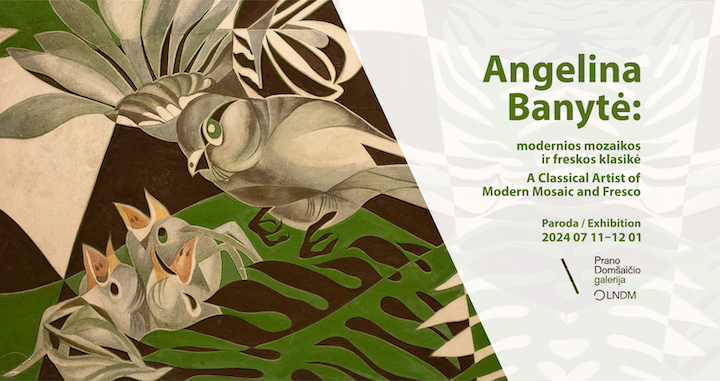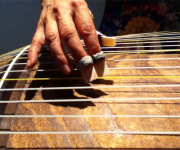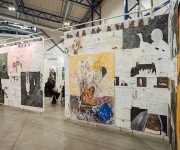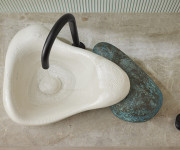At 6 pm Thursday, 11th July Pranas Domšaitis Gallery of the LNMA invites the citizens of Klaipėda and its visitors to the opening of the exhibition Angelina Banytė: the Classic of Modern Fresco and Mosaic. The mural paintings and mosaics of a monumental scale by the female artist, created using the techniques of fresco, sgraffito and easel painting, are located in different public places of Lithuanian towns. The public is invited to see her new solo exhibition curated by Ramutė Rachlevičiūtė, professor at Vilnius Academy of Art, and to rediscover the artist based in Klaipėda until December 1st.
The exhibition Angelina Banytė: the Classic of Modern Fresco and Mosaic is like another event of an informal art series of the port town. This year the gallery presents two artists of the senior generation, both nominated as “Masters of Culture” by the town of Klaipėda, the sculptor Algirdas Bosas and the mural and mosaic artist Angelina Banytė. Having settled in Klaipėda in the 70s, since then they have contributed to the emergence of a distinctive style in the port town.
“The two artists are linked not only by their geographic location. Both tend towards a post-Romantic interpretation of nature and uphold a universal perception of human nature and history,” Skaistė Marčienė, director of the gallery, says.
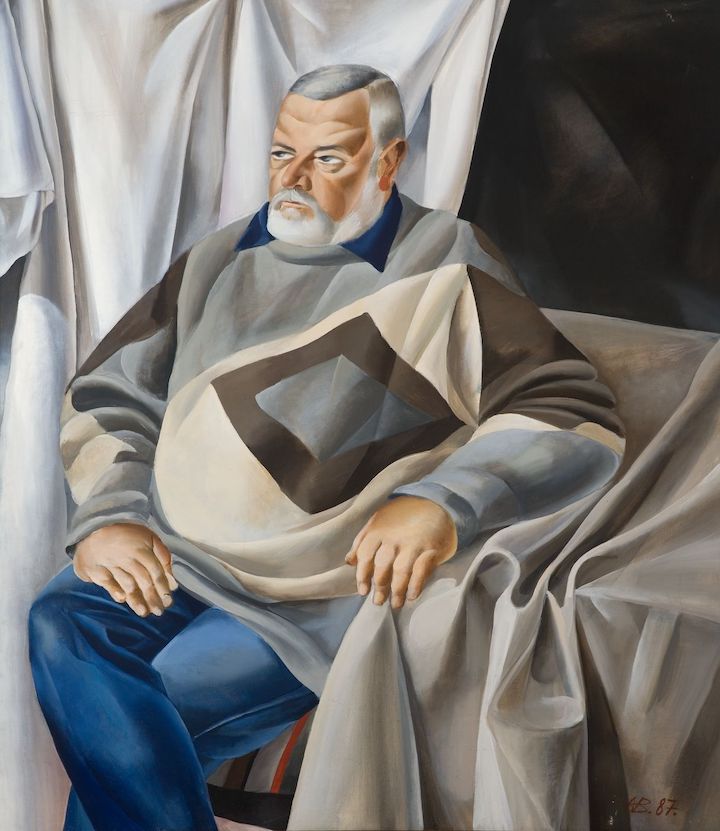
Angelina Banytė, Portrait of director Povilas Gaidys, canvas, oil, 1987, Lithuanian National Museum of Art ©
The artist who needs no easel
The exhibition Angelina Banytė: the Classic of Modern Fresco and Mosaic features over 60 pieces by the artist from Lithuanian museums and from private collections, among them paintings, sketches, designs of frescos and mosaics from the artist’s studios. Her works strike through their monumental scale, the power of expression and clarity. The entire body of her work produced over 45 years would cover over 1000 sq meters.
“My works are only commissions for architecture. When there are no walls for frescos, there is no me,” the artist speaks of the nature of her work.
Angelina Banytė has created mural paintings for different towns in Lithuania, decorating both, the public buildings, and their interiors. Her piece The Country of Dainava is a focal point of the Dainava Spa in Druskininkai. The spas Gintaras and Pušynas in Palanga, are also decorated by her work, her sgraffito piece in the courtyard of the Nidos Smiltė Hotel captures the eye. In Vilnius, she collaborated with her teacher Sofija Veiverytė and the painter Natalija Daškova to produce her most famous and largest fresco Our Land.
“Banytė belongs to the generation of monumental painters, who, speaking figuratively, has had no need of an easel. She stood at the wall to create her work. Two square meters are quite a scale for “pure” painting, while for Banytė her average scale is approximately 15 sq meters. Spacious are the walls, which saw the slow birth, depending of the technologies and creative stamina, of mural paintings in different techniques of fresco, sgraffito and mosaics,” the curator Ramutė Rachlevičiūtė gives the sense of scope of the artist‘s output.

Painters Angelina Banytė ir Juozas Vosylius in the courtyard of the Clock and Watch Museum, photo by Vytautas Karaciejus, 1996, Klaipėda County Ieva Simonaitytė Public Library ©
Having found her inspiration in Klaipėda
According to the curator Rachlevičiūtė, the artist received plentiful mercies from fate: “In 1968, she graduated with the third class from M. K. Čiurlionis Secondary School of Art, creating her graduation work under the supervision of Vytautas Ciplijauskas. Subsequently, she studied fresco and mosaic under Prof. Sofija Veiverytė at the former Institute of Art. Banytė inherited from her teacher that exquisite style in drawing, precise and expressive, which she later emulated it in her own way, achieving in her creations a unique sense of space and authentic architectonic reflection. Still as a student, in 1973, Banytė created her impressive fresco piece, The Feast.
“In 1974, Banytė, a young graduate was looking for a place to live and for a studio to work. In 1976, the legendary benefactor of Klaipėda Alfonsas Žalys invited the talented artist to the port town and provided her with the basis for work. The year 1978 was important for the artist’s career: she gave her first solo exhibition and was admitted into the Lithuanian Artists Association,” the curator Rachlevičiūtė recounts the story of the artist’s career.
Klaipėda has played a role of importance in her path, thus it is here where most of the artist’s production is concentrated. The citizens of Klaipėda are familiar with her fresco The Medicine located in Klaipėda Hospital, The Birds in Klaipėda Maternity Home, and the piece Time and Klaipėda (collaboration with J. Vosylius). Her other works are at the Clock and Watch Museum of the LNMA, a series of frescos at the Faculty of Humanities of Klaipėda University. Banytė creates artwork on the religious theme as well, one of them located in the Church of the Blessed Virgin Mary, Queen of Peace, in Klaipėda, and another is featured in the facade of the Chapel of Lėbartai Cemetery (collaboration with Arvydas Bumblys). A mosaic, dedicated to the Virgin Mary the Patroness of all Saints and the Afflicted, one of her most recent and largest pieces, is featured in the facade of the Church of St Francis of Assisi in Klaipėda.
In 2013, Banytė’s merits in mural painting were recognized by the title of Master of Culture of Klaipėda.
Curator Ramutė Rachlevičiūtė
Coordinator Aurelija Malinauskaitė
Exhibition architect Ieva Glumac
Designer Loreta Uzdraitė
Lenders to the exhibition: Angelina Banytė, M. K. Čiurlionis National Museum of Art, Klaipėda Drama Theatre, Klaipėda Section of the Lithuanian Artists’ Association, Rietavas Oginski Cultural History Museum, Birutė Jokužienė, Edmundas Kolakauskas, Giedrius Lukaševičius.

